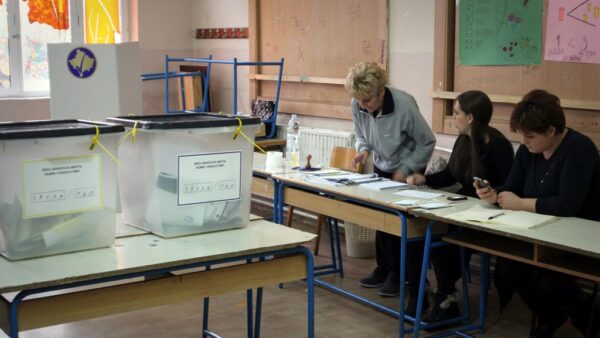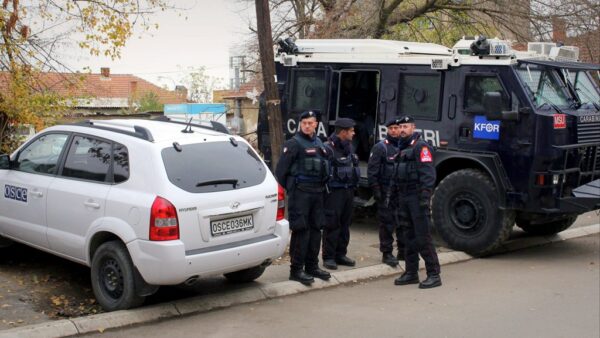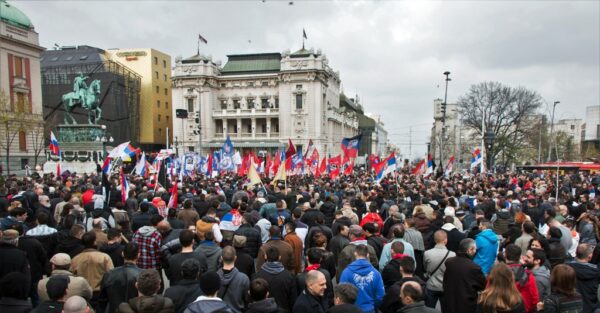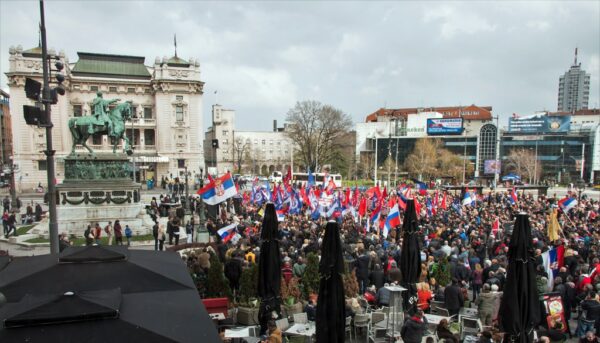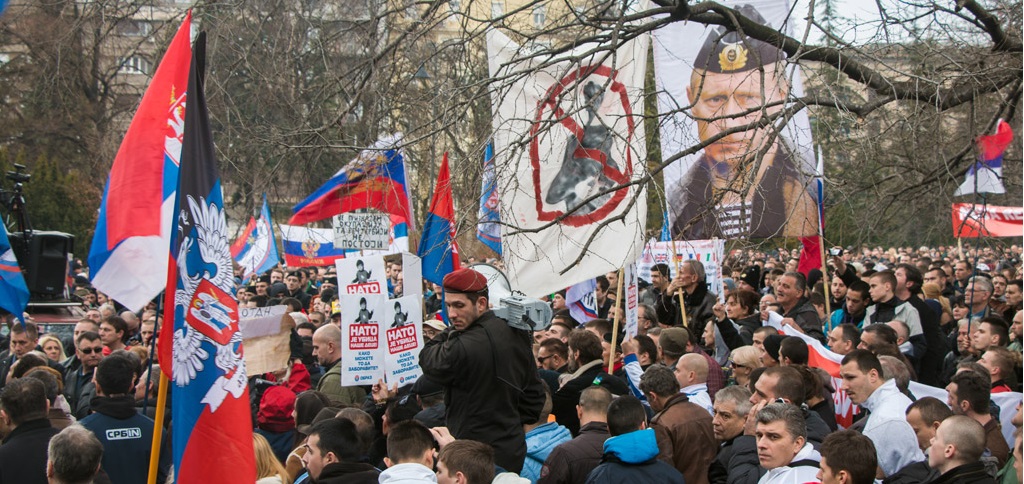 Protests outside the presidential palace in Belgrade on February 20th against the agreement quietly signed by the government and NATO, which will give the alliance access to all of the country’s territory. Several similar protests were organized after this one and the largest of these, with 10 000 participants, took place on March 24th. That protest was organized by the political party SRS and was directed against NATO, the government and the verdict against Radovan Karadžić, who on that very day was sentenced to 40 years in prison for war crimes by the International Criminal Tribunal for the former Yugoslavia in the Hague. Photo: Sergeyj Belous/Nya Tider
Protests outside the presidential palace in Belgrade on February 20th against the agreement quietly signed by the government and NATO, which will give the alliance access to all of the country’s territory. Several similar protests were organized after this one and the largest of these, with 10 000 participants, took place on March 24th. That protest was organized by the political party SRS and was directed against NATO, the government and the verdict against Radovan Karadžić, who on that very day was sentenced to 40 years in prison for war crimes by the International Criminal Tribunal for the former Yugoslavia in the Hague. Photo: Sergeyj Belous/Nya Tider
Serbia’s Asymmetric Neutrality: Teetering Between NATO and Russia
From the NATO bombing of Serbia in 1999 until today the West is holding Serbia under its thumb. However, Russia also has its say in the affair. Nya Tider has the story on the grey-area nature of this conflict, possibly a case of “imperialism in our time”.
Published: May 2, 2016, 11:37 am
“We intentionally set the bar too high for the Serbs to comply. They need some bombing, and that’s what they are going to get.” – With these words, then US Secretary of State Madeleine Albright described the draft of the Peace Agreement as she talked to journalists off the record behind the scenes of the Rambouillet Conference on the Settlement of the Kosovo Crisis in February 1999.
The Yugoslav delegation was expressing its readiness for any compromise except independence for Serbia’s Kosovo province – on which the Albanian side insisted.
The Yugoslavs were only presented with the final draft agreement on the last day of the talks, seeing the key two thirds of the text for the very first time that day. They were literally given a couple of hours to review and sign the deal, which had thus become an ultimatum. In particular, one of the newly added chapters (No 7, appendix В), required a surrender of Yugoslav sovereignty that would allow the presence of NATO troops not only in Serbia’s southern Kosovo province, but across the entire territory of the Federal Republic of Yugoslavia (FRY), which at that time was composed of the constituent republic of Serbia (including its northern autonomous province of Vojvodina and its southern autonomous province of Kosovo) and the constituent republic of Montenegro.
NATO personnel were to be “immune from any form of arrest, investigation, or detention by the authorities in the FRY” and, in addition, its representatives would enjoy, “together with their vehicles, vessels, aircraft, and equipment, free and unrestricted passage and unimpeded access throughout the FRY, including associated airspace and territorial waters.” And these are only selected quotations from Chapter 7 that gave NATO all kinds of other privileges and authority, incompatible with the concept of the national sovereignty of the intended host nation.
Official Belgrade, viewing the conditions as the equivalent of occupation and surrender, refused to sign (in fact, even Moscow’s representative noted in the Referral Letter to the Draft Accord that “Russia does not agree with Appendixes 2 and 7”).
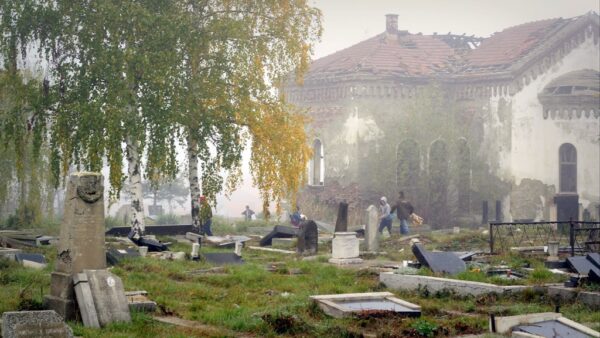
Desecrated cemeteries and vandalized churches. The Serb population in Northern Kosovo has been persecuted by the Albanians, supported by the West, without any action from the NATO peacekeeping troops. The photo dates from March 2013 and shows an orthodox cemetery in a part of Kosovska Mitrovica that is now Albanian. Photo: Sergey Belous
The Yugoslav refusal to surrender, and their call for further discussions, was twisted into a casus belli by NATO. Upon the Serbian government’s formal rejection of the ultimatum document, NATO began missile and bombing attacks on Yugoslavia on March 24, 1999. It is telling that even the most experienced American diplomat, Henry Kissinger, later called the text “a provocation, an excuse to start bombing”. (In full, Mr Kissinger said: “The Rambouillet text, which called on Serbia to admit NATO troops throughout Yugoslavia, was a provocation, an excuse to start bombing. Rambouillet is not a document that an angelic Serb could have accepted. It was a terrible diplomatic document that should never have been presented in that form.” This Mr. Kissinger said in the Daily Telegraph, 28 June 1999.)
The UN Security Council gave no authorization for NATO’s Operation Allied Force, which lasted 78 days, and destroyed or damaged 89 plants and factories, 48 hospitals and clinics, 70 schools, 18 kindergartens, 9 university buildings and 4 hostels, 82 bridges, 35 churches, in 29 monasteries along with causing extensive further human and material destruction —nonchalantly referred to as “collateral damage”—for which NATO refused any compensatory responsibility. Yugoslav authorities estimated the damage to infrastructure and the economy at 100 billion US dollars.
The tragedy was worsened by the fact that the shelling, which included the use of banned cassette bombs and missiles containing depleted uranium, about 2,000 civilians were killed and more than 10,000 seriously wounded.
Considering this indelible historical context, the Serbian Parliament’s recent (February 12, 2016) ratification of a NATO agreement “on logistic support cooperation”, strikingly similar to the Rambouillet Ultimatum, acquires profound significance.
Demands considered “a bar too high” for 20th-century Belgrade, which was willing to face war single-handedly against the most powerful military alliance in history, have since been accepted step by step, in relative obscurity and silence by the subsequent Serbian authorities over the past decade.
Particularly, the “Agreement between the Republic of Serbia and the NATO Support and Procurement Organization (NSPO) on logistic support cooperation” obliges Belgrade to provide NSPO personnel with liberty of movement around the country (Article 10, paragraph 2), access to state-owned and private objects (Article 11, paragraph 1), diplomatic immunity in accordance with the Vienna Convention (Article 10, paragraph 1), as well as fiscal and tax exemption for the Alliance and its representatives (Article 10, paragraphs 4 and 5).
Notably, the agreement was signed as early as September of 2015, effectively in secret, without notifying any media, leaving the Serbian public to wake up to the new reality only after parliamentary ratification in February 2016 (even the key TV channels were directed to avoid broadcasting the news). Replying to broadening popular protests and criticism from political opponents, Serbian PM Aleksandar Vučić indignantly tried to turn the tables: “If we ask NATO to protect Serbs in North Kosovo, how can we forbid them to pass into North Kosovo?”
The rhetorical question is in fact absurd, and not only because NATO has its own airfields and its second-largest European base in “Camp Bondsteel” in Kosovo. A simple illustration of NATO’s reach should be sufficient. On November 3, 2013 the NATO-backed Pristina authorities held municipal elections in Northern Kosovo for the first time. By the end of the day, participation ranged from 5 to 14 per cent in various Serbian localities: they did not want to legitimize the self-proclaimed Republic and organized a massively successful boycott of the so-called “Albanian elections”.
In the evening, a provocation occurred: a group of men carrying baseball bats (Serbs don’t play baseball), arrived in a black jeep without any license plate, stormed one of the polling stations in northerly Kosovska Mitrovica and destroyed ballot boxes (notably, local Pristina-controlled police vacated the station half an hour before the assault). Though the raid was not in the interest of the boycott campaign, who was not involved (I was a witness), Belgrade, Pristina and Brussels (as well as their respective mainstream media) blamed the Serb boycott leaders, and attempted to blame the whole day of negligible turnout on the so-called “intimidation” on the part of the boycott campaign.
In an attempt to overcome the boycott’s effectiveness the elections were extended until a second voting day in the area, on November 17. On that day Kosovska Mitrovica was swarming with military and police armed to the teeth (even armoured vehicles) including NATO KFOR, EU police and the ethnic Pristina-controlled Kosovo police corps. Curiously though, NATO saw no problem deploying to North Kosovo for this intervention to crush Serb peaceful protests and to provide a show of force to the local Serb population.
Thus, the elections (initiated by the EU) were held literally “at gunpoint”. Ultimately, in spite of all such pressures, threats of dismissal from work, and of a suspension of pensions and social benefits from Belgrade, together with all possible rigging, the voter turnout still rose only to a purported 22.8 per cent!
None of these extra-legal pressures or manipulations prevented the EU from recognizing the “elections”, although in February 2012 Brussels had refused to recognize a referendum in North Kosovo, in which 99.74 per cent of those voting rejected any legitimization of “Kosovo Republic authorities” in a poll that saw an impressive 75.28 per cent turnout. However, let us return to the subject reviewed.
One phrase, later much quoted, was a keynote of the above-mentioned apologetic speech of the Serbian PM in favour of the ratified agreement with the alliance: “We need NATO as an ally protecting our people in Kosovo and Metohia”. In one respect the phrase is nonsensical, as after the NATO troops entered the territory of Kosovo, at least 210,000 people were internally displaced in their own country during just five months of the international peacekeeping force’s presence, according to UNHCR, after more than 300 Serbs were murdered and 455 were kidnapped or otherwise disappeared. Besides, during the infamous pogrom of March 17-19, 2004 the representatives of the Treaty passively watched the Albanian extremists burn more than 900 Serbian houses, set fire, desecrate and ruin 35 Orthodox monasteries (many of them had been founded as early as in the 14th, 15th and 16th centuries and some were even under UNESCO protection), as well as oust more than 4,000 Serbs from the region. On the other hand, in fairness we must read between the lines of Aleksandrar Vučić’s speech, noting the innuendo of desperation: in case of opposition to Brussels such tragedies are prone to repetition. Not once have I heard from my Serbian colleagues such commentaries, fraught with fatality: what choice does Serbia have, when it has NATO troops as lodgers?
One of the influential MPs from the ruling party asked me the question, both intricate and indignant, in the course of our discussion of the negotiations in regard to Kosovo status with EU mediation: “Why do you think Albanians have stopped attacking Serbs and burning their houses now? Do you take it as an accident? Can you even imagine, what will happen if we reject the negotiations and the process of normalisation of relations with Pristina? Heaven forbid you to see what would happen then – that would have been horrible!”
In all fairness, if we put aside the subtlety, what he meant was the covert, but nevertheless dangerous blackmail that Belgrade has to deal with.
In this sense, taking into account the above-mentioned, it is worth citing the words of Russian Foreign Office representative Maria Zakharova: “This is a specific kind of humiliation, the imposition of the Stockholm Syndrome, when they [the West – the author’s note] force their victims to love them and publicly ascertain that they want to join them.” Zakharova’s comment followed the near-synchronous timing of Belgrade’s ratification of the NATO logistic deal and the US air force’s killing of two Serbian embassy workers in the aerial bombardment of the exact ISIS base in Tripoli where the Serbs had been held since being kidnapped in November 2015).
Alignment without acceding
It is symptomatic that Serbian authorities are relentless in assuring their citizens and Moscow of having zero intention to join the North-Atlantic Treaty. “Serbia is not going to accede to NATO, it wants to remain militarily neutral”, said Prime-Minister Aleksandar Vučić yet again (on March 2, 2016), commenting on the opposition parties’ demand to hold a referendum on the issue. According to the head of government, it is a “fringe concern” and it does not call for a plebiscite. Indeed, the results of such an expression of the popular will are quite predictable, as, according to the latest opinion polls held in January-February of this year (and published in pro-western Serbian weekly “Vreme”), only 10.5 per cent of Serbian citizen’s support joining NATO, whereas 79.1 per cent are against it (10.4 per cent abstained). Besides, another recent poll by Ipsos revealed a similar picture: only 7 per cent of the population display a positive attitude toward the Alliance.
Exactly for this reason, the ratification of the above agreement was covered by the media only after it happened, and President Tomislav Nikolić hurried to sign the relevant law (approving the agreement) one day before expected, on February 19, just before the announced demonstration demanding that the guarantor of the constitution should veto this law. The authorities evidently also attempted to wrest the “master card” from the grasp of their opponents – the head of state said (the same day) in his commentary to the Serbian branch of the Russian Sputnik agency that the Russian-Serbian Humanitarian Center (RSHC) in Niš (founded as early as in 2012 and engaged in prevention and containment of emergencies) would obtain a diplomatic status similar to that of the NATO Support and Procurement Organization (NSPO). (We will return to this subject a bit later).
The incident during the anti-NATO protest itself, which took place the next day, on February 20 at the walls of the President’s residence in the heart of Belgrade and concluded with the march towards the Russian embassy (remaining for many of the opposition leaders with a patriotic inclination a kind of a “bastion of hope”), is also interesting. While the outraged orators, particularly the initiators of the meeting – “Zavetnici” movement – accused the authorities of the sell-out of national interests, and the protesters (about five to six thousand people) cheered the fiery speeches, repeatedly and loudly chanting anti-government slogans, of which “Treason!” was the most politically correct one, the leading TV channels either ignored the protest altogether or confined themselves to tight-lipped information about “several hundred protestors.”
President Tomislav Nikolić, in his turn, reacted to an avalanche-like barrage of complaints on the part of Serbian civil society with an opinion piece in the popular newspaper “Večernje Novosti” with the telling headline “Why I signed the NATO Law”. The head of state explained his decision with the claim that legal foundations and prerequisites for it had been laid as early as ten years ago, when Serbia joined the Partnership for Peace program in 2006, and when NATO opened its Military Liaison Office in Belgrade in December of the same year (the staff of which had been granted diplomatic immunity back then, the president stressed). Besides, the essay claimed that the signed Law on Logistic Support would facilitate the cutting of Belgrade’s expenses on Serbian Army participation in multinational operations under the auspices of the UN and EU, as well as “form the legal framework, within which Serbia will be able to use trust funds, granted it reaches agreements with NATO.” In particular, one such fund has already made provisions for donations to the extent of USD 3.7 million aimed at founding a regional center for the disposal of excessive military ammunition on the premises of a repair and engineering works in the city of Kragujevac. Nikolić placed special focus on the reciprocity principle providing for similar privileges in regard to fiscal and customs exemption for the Serbian party in the territory of states participating in the Partnership for Peace program (but to be honest, it is hard to imagine Serbia’s troops marching across the EU). According to the president, “Serbia is very skillfully finding balance in extremely complicated international political and security relations,” and the growth of tension in Serbian society coming from opponents of the agreement merely destabilizes the country and affects its well-being.
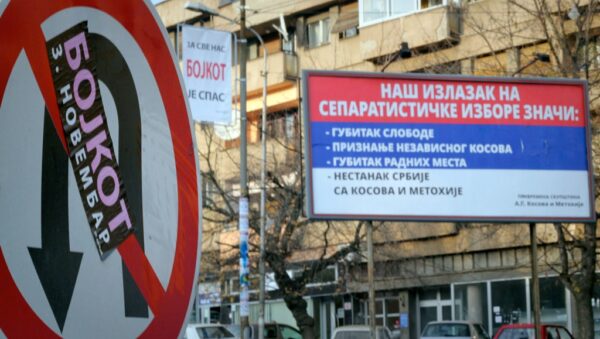
”Boycott!” Most Serbians in Nothern Kosovo didn’t recognise the elections as legitimate. Photo: Sergey Belous
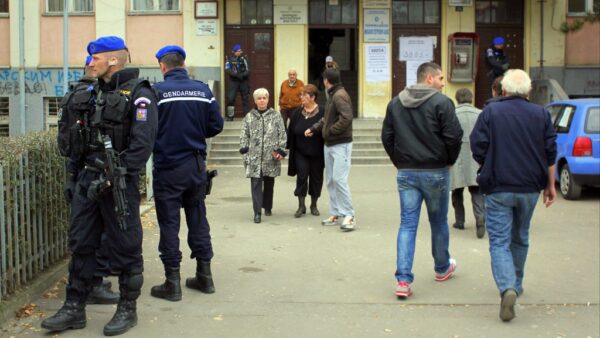
The election in Kosovska Mitrovica on November 17th 2013 took place under heavy protection from the EU and Kfor, which the Serbs, who boycotted the election, perceived as a show of force and “an election under threat of violence”. Photo: Sergey Belous
On the whole, the Serbian leader’s essay leaves an impression that he lays the lion’s share of responsibility for the alignment with the Treaty on the preceding governments. However, let us briefly review the entire process – it will allow for adequate understanding of the above-mentioned agreement and provide a clear idea of Serbia’s real prospects in foreign policy.
It all started at once after the “electoral revolution”—the first in world history—took place in Belgrade in October of 2000 with the crucial backing of Washington, in the course of which the then president of the Federative Republic of Yugoslavia, Slobodan Milošević, a noted critic of Western interference, was ousted. A propos, later the same political technology devised by the same overseas political actors was used in Georgia (2003), Ukraine (2004) and Kirgizia (2005). The new government swiftly and uncompromisingly changed the course of the country’s foreign policy toward European integration, which, in its turn, determined the need to incorporate Serbia into European security architecture, closely tied with the North-Atlantic Alliance.
Then in July of 2005 followed the signature of the agreement with NATO on transit of forces engaged in peacekeeping operations (generally needed for the passage of KFOR through Serbian territory – which, by the way, Prime-Minister Vučić tried to present as a novelty) became the first landmark. This document provided for the opening in December, 2006, of the above-mentioned NATO Military Liaison Office in Belgrade that was responsible for its implementation, as well as for reforming the Ministry of Defense and Serbia’s cooperation with the Treaty within the framework of the PfP, also signed at that time. The document was a kind of precursor of the so-called Status of Forces Agreement (SOFA). By the way, all those acts had also been justified back then by the necessity of protecting Serbs in Kosovo, and KFOR had been called “their sole security guarantee” by the Defense Ministry. SOFA – the key document in the sense of cooperation with NATO – was signed practically in secret in January of 2014 (and not in 2006, as Nikolić claimed in his essay) in Washington by the then Minister of Defense Nebojša Rodić (a member of the ruling Serbian Progressive Party) and similarly stealthily, without any public discussions, ratified by the Serbian Parliament in July of 2015. Notably, it all happened approximately at the same time, when Russia vetoed the distinctly anti-Serbian UN draft Resolution on Srebrenica (pushed by the leading NATO members), having in this manner supported Belgrade. President Tomislav Nikolić had even remarked back then that thus “the stigmatization of the entire Serbian nation as the one whose goal is genocide” was countered and that “Russia showed and proved that it is a real and honest friend.”
According to this agreement, Belgrade obliged to make the use of Serbian military infrastructure possible for the Alliance, to allow training of NATO soldiers at the military base “South”, to bring Serbian legislation in compliance with the EU regulations and apply NATO standards and the Bologna process norms to the system of education of Serbian officers. Besides, the document’s text stipulates in detail the legal aspects of the status, authority and responsibility of the military men of the country of origin and the recipient party.
The next stage was the signing in January of 2015 of an operative document entitled “Individual Partnership Action Plan” (IPAP), in which the widest range of cooperation between Serbia and the North-Atlantic Treaty Organization is specified, not only in the sphere of security and defense, but in the areas of human rights, economic, domestic and foreign policy, including the aspect of European integration. At that, this last issue is even indirectly tallied to the Alliance – the provision in regard to “ensuring of coordination and complementarity between IPAP and the EU integration efforts” (it should be noted that SOFA ratification was provided for by this exact document). Moreover, incredible as it may seem, Serbia pledged to introduce “a public information strategy on cooperation with Euro-Atlantic structures through PfP with the aim of gaining public support” – that is, Serbian taxpayers will have to pay out of their pockets for the propaganda aimed against them (admittedly, this has been already going on for some time).
Thus, together with the Agreement on Logistic Support (NSPO) referred to earlier, all of the above arguments have so crucially “tied” Belgrade to the North-Atlantic Treaty that official accession makes no sense now (in addition, it is quite impossible because of the absolutely negative rating and the unresolved Kosovo problem). As well-known analyst and editor-in-chief of the bulletin “New Serbian Political Thought” Djordje Vukadinović remarked aptly, “Serbia may not have formally entered NATO, nevertheless NATO has largely entered Serbia.”
It should be said that the trick is right in it, in this adamant and ostentatious “non-accession” of Serbia to the Alliance: firstly, it puts the Russian political elite off guard (and it would have, obviously, reacted extremely negatively to such a somersault), secondly, it helps to save the face of the current government in the eyes of the electorate, and thirdly, most significantly: Brussels (for which, read: Washington), having acquired the desired privileges, guarantees and authority, is at the same time avoiding making serious pledges to Belgrade, letting it neither influence the Alliance’s decision-making, nor “excessively” align with Moscow.
However, after Montenegro (with the odd connivance of the Kremlin) had been finally drawn into NATO’s area of influence and had already been planning to become a fully-fledged member of the Alliance this year, the geostrategic attractiveness of Serbia in Russia’s eyes deteriorated seriously because it was losing its last chance of having free access to the Adriatic coast.
“The geopolitical split”
Nevertheless, in Serbia the result of the perpetually intensified Euro-Atlantic propaganda seems totally reversed: the esteem of the Russian Federation among the population is growing, and the idea of the “European choice” is losing its former, already disappointed supporters. Sociological research by Ipsos shows it quite distinctly: if in 2014, 54 per cent of the citizens would vote in favour of joining the EU, then by the beginning of 2016 this index dropped to 48 per cent; whereas 46 per cent of respondents expressed a positive attitude to Russia in 2014, this year the figure reached an overwhelming 72 per cent! Simultaneously, the above-mentioned opinion poll of the “Vreme” weekly does not only present the similar figure in regard to the supporters of European integration – 50.9 per cent, but also contains the box “Do you support a union with Russia?” in response to which 67.2 per cent of the those polled answered positively (18.8 per cent are against, and 14 per cent abstained). (One cannot fail to notice that in this particular case the sum of both incompatible options in Serbian foreign policy exceeds 100 per cent – this is the consequence of the notorious policy of “military neutrality”, although Russia has repeatedly stated its respect for Serbia’s European integration intentions). And, finally, the most recent research, conducted by the non-governmental (but financed by Western foundations and states) organization Center for Free Elections and Democracy (CESID) in the lead-up to the early parliamentary elections scheduled for April 24 brought no less significant results: 71.6 per cent of the population voted against “Serbia joining EU and NATO” (with 11.2 per cent votes in favour and 14 per cent abstainers), and 55.2 per cent voted for “the traditional affiliation with Russia” (against – 19.2 per cent, 21.5 per cent abstained).
Notably, such transformations of public opinion caused a reaction close to panic among Serbian supporters of Euro-Atlantic alignment. Widely known in certain quarters, the Director of the Belgrade Center for Euro-Atlantic Studies Jelena Milić, a fervent NATO lobbyist, who loves to brandish the long list of her Western sponsors in the course of her public appearances, having mustered support of the US embassy and the Rockefeller Foundation, devoted the entire conference to the “problem” entitled “Serbia and Russia: Russian influence upon the stabilization, democratization and European integration of Serbia.” It is interesting that, in spite of the proclaimed openness of the conference to the media, several Serbian and Russian journalists were denied registration, allegedly due to the fear of provocations – that was how the lady justified her denial in reply to my reasoned question. “No one will doubt the drop in the level of European-integration support in Serbia,” complained Milić in the course of her lead-in report. The Head of CEAS explained the phenomenon to the audience with the following: “The climate in Serbia is such that ‘the perfect storm’ of Russian interests is raging in it, striving to stop Serbia in the process of its democratization, stabilization and European integration, and, on the other hand, the ruling structure has its own interests, unwilling to see Serbia in the politically demanding European Union.” Although such accusations made at the conference were not backed by credible facts, they sounded harsh enough, replete with ultimatums. But let’s get back to reality.
One of Moscow’s interests in the country is in obtaining diplomatic status for the Russian-Serbian Humanitarian Center in Niš similar to that which was recently granted to NSPO. It should be recalled that in May of 2014, when Serbia suffered from a devastating flood, Russian emergency workers were the first who came to its rescue, and in the course of two days they alone evacuated more than two thousand people (including over 600 children) from the flooded areas; also during the operation of disaster mitigation the aircraft of the Emergency Ministry of Russia delivered more than 140 tons of sundry humanitarian cargo to Serbia and Bosnia.
In spite of the fact that the draft of such an agreement was approved as early as in October of 2014, its signing has repeatedly been postponed without any valid reasoning. According to the German magazine “Der Spiegel”, the essence of the problem is Germany’s opposition to the growth of Russian influence in the Balkans: “Merkel phoned Serbian PM Vučić,” the magazine writes, “and demanded that the agreement should not be signed, because Berlin fears that the center in question can turn into a stationary base for Russian spies.”
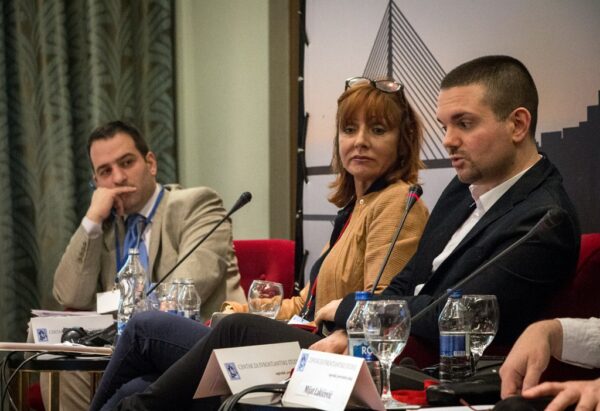
Conference on Serbia and NATO on February 22nd, organized with the support of the US embassy and the Rockefeller Foundation. The organizer, Jelena Milić (center), the director of the Belgrade Center for Euroatlantic studies, called it “Serbia and Russia: Russian influence on the stabilization, democratization and European integration of Serbia”, which in her mind was a problem that needed to be addressed. In her opening statement she declared that “nobody can doubt the major decline of support for European integration in Serbia”. Approximately a hundred people were present, among them senior NATO commanders. Despite the fact that the conference was supposed to be open to the media, a number of Russian and Serbian journalists were kept outside out of fear of “provocations”. Photo: Sergey Belous
Recently this issue was once again dealt with, this time by Russian Vice Prime Minister Dmitry Rogozin, in the course of the First Vice Prime Minister and Head of Foreign Office of Serbia Iviсa Dačić’s visit to Moscow on March 31 (2016). According to Rogozin, the signing of the intergovernmental agreement on conditions of stay, privileges and immunities of the RSHC should be speeded up in order for “the real chance …of participation in significant humanitarian events, including UN-sponsored” to appear. The Russian Vice PM specifically stressed that RSHC has “absolutely nothing to do with security and defense issues.” Discussion of the subject gained momentum the next day at the joint press conference of the Heads of the Russian and Serbian Foreign Offices. In particular, Russian Foreign Minister Sergey Lavrov made an interesting remark: “Over the years of the Center’s existence in reaction to such fears and lamentations we invited the EU and US to visit the Center and see for themselves, what the experts were engaged in. As was expected, the EU people rejected the invitations. They know that their pleas are fictitious.”
It should be noted here that the idea repeatedly stated by Serbian politicians regarding “compensation” of the Agreement on NATO Logistic Support through the granting of diplomatic status to the Russian-Serbian Humanitarian Center is in fact an example of double-talk, as RSHC is not a military structure, contrary to NSPO. President of Serbia Tomislav Nikolić made a statement in the course of his March visit to Moscow in regard to the above-mentioned agreement with NATO, which is a graphic example of such rhetoric: “President Putin understands what we signed and when we did it. …We totally agree that Serbia should remain militarily neutral. And in my opinion, in this case we must seek balance. What we have signed with one party should be signed with the other one – without involvement and joining any military alliances.”
One should also pay attention to the very formula “military neutral,” which the state officials of Serbia repeat each time as a mantra. They are referring back to the parliamentary resolution of 2007 during which, with reference to the negative role of NATO in the modern Serbian history, the decision was taken “on (the) declaration of the military neutrality of the Republic of Serbia in regard to the existing military alliances until eventually a referendum is called in order to ultimately resolve this issue.” However, in accordance with international law, namely the Hague Convention of 1907, in case of war “passage of troops or convoys with military or food reserves through the territory of a neutral state is prohibited”. So, in essence, the Agreement on NATO Logistic Support could, hypothetically in case of a regional or international conflict, annihilate Serbia’s neutral status. Besides, EU integration in itself implies carrying out a “unified policy in the security and defense sphere,” which does not accord even with such a euphemism as “military neutrality.”
Admittedly, the consequences of the attempts “to keep a foot in both camps” can be seen already. Wishing to preserve a good relationship with Moscow (as well as the image of “Russophiles” in the eyes of their electorate) Serbian authorities have at first abandoned voting on the issue of the illegitimate accession of the Crimea by Russia at the UN General Assembly in March of 2014, and later categorically refused to join anti-Russia sanctions. In summary, as Serbian Pro-Western newspaper “Blic” wrote as early as in October of 2015, the coordination by official Belgrade of its “behavior” with the EU, in other words, introduction of anti-Russian sanctions is a necessary condition for the continuation of the European integration process, which at the given stage implies the opening of the so-called 31st chapter of the negotiations dossier entitled “External policy, security and defense policy,” planned exactly for 2016. And even Prime Minister Vučić acknowledged later that the European Commission had intentionally lowered the estimates of Serbian progress in foreign policy in its Report in November of 2015 exactly because of Serbia’s friendly relations with the Russian Federation. European Commissioner for Neighbourhood Policy and Enlargement Negotiations Johannes Hahn made an uncompromising statement in this regard during his interview with Serbian newspaper “Večernje Novosti”, also in November: “Serbia made legal obligations to gradually coordinate its position with the EU within the framework of Enlargement Negotiations concerning difficult issues, such as sanctions against Russia. This is very important, and we expect Belgrade to meet these obligations.”
We should also not forget the fact that Serbia has the status of observer in the Collective Security Treaty Organization (CSTO). Overall, the level of Belgrade’s cooperation with the CSTO is disproportionately lower than that with NATO. Nevertheless, in the course of the last meeting of the head of state with the General Secretary of the Organization Nikolay Bordyuzha on April 5, the latter marked the organization’s contribution to the development of the Serbian defense industry. On his part Bordyuzha suggested carrying out information exchange between the security services of the CSTO countries and Serbia, which would help Belgrade to counteract terrorism, drug trafficking, organized crime and all kinds of emergencies. As far as direct Serbian-Russian cooperation in the military sphere is concerned, we should take into account some very telling comparative statistics: only two joint exercises of Serbian and CSTO troops were held in 2015, whereas together with NATO 22 military exercises were performed; out of 24 military agreements, signed by Belgrade with foreign military structures, 22 are with the Alliance member countries and only two were signed with the RF. The proverbial “balance” is clearly lopsided, and the “neutrality” is quite lame.
Nevertheless, even this quite limited cooperation with Moscow caused sharp criticism on the part of the EU: for example, press secretary of the European Commission Maja Kocijančič condemned the agreement of the Serbian party to Moscow’s proposal made in August of 2015 on holding joint special task forces exercises in 2016: “Under the circumstances the joint military exercises of Serbia and Russia will send a wrong message.” Such a “coincidence” is also curious: on the same day, when the proposal of joint exercises arrived from Russia, the then Minister of Defense of Serbia received a visit from US ambassador Michael Kirby (and the earlier dispatches of the American embassy in Belgrade, published in Wikileaks lead us to a conclusion that such visits do not come by chance).
In conclusion we would like to note that all of the above reveals the close links between the gradual Serbian commitment to NATO and the furtherance of European integration, the pursuance of which, as today’s reality proves, leaves no loophole for the Serbian authorities to keep on with the traditional “policy of non-alignment”, inherited from the times of Marshall Tito, under the in-vogue brand of “military neutrality.” On the other hand, there exists huge domestic demand for alignment with Russia, which cannot be ignored in view of the clear electoral issue that the relationship with Russia has become.
Despite the victory of Mr. Aleksandrar Vučić’s Serbian Progressive Party (SNS) in the April 24 elections with slightly less than 50 per cent of the votes, he will have to contend with the Serbian Radical Party (SRS) that managed to gain 7.8 per cent and will be represented in parliament for the first time in four years. Headed by the most pro-Russian politician, Doctor Vojislav Seselj, who was recently acquitted by the International Criminal Tribunal for the former Yugoslavia of war crimes, the party has vowed to oppose further EU integration. However, the current authority benefits from the fact that the patriotic pro-Russian opposition is extremely splintered, and controversies do not cease in its ranks (paradoxical as it is, but the leaders of the opposition accuse each other of serving the authorities or Western secret services, adorning their rivals with the “Trojan horse” label that has become popular; in fact, the enthusiasm revealed in the course of these squabbles makes one ask the “Cui bono?” question and conclude that the accusations may be partially feasible).
The new government under Vučić will also face the same challenges as it has done up to now. The sweeping divergence of positions of the integrated West (the Euro-Atlantic community) and the Russian Federation (if it is not overcome by way of compromise, although nothing of the kind is noticeable at the moment), will, figuratively speaking, reach Belgrade itself as a kind of creeping “geostrategic fault.” Having ultimately placed its elite in the position of Zugzwang, (a situation found in chess and other games wherein one player is put at a disadvantage because they must make a move when they would prefer to pass and not move), Serbs will not longer be able to sit on the fence and will have to choose between the two geopolitical adversaries that are keenly watching their every move.
All rights reserved. You have permission to quote freely from the articles provided that the source (www.freewestmedia.com) is given. Photos may not be used without our consent.
Consider donating to support our work
Help us to produce more articles like this. FreeWestMedia is depending on donations from our readers to keep going. With your help, we expose the mainstream fake news agenda.
Keep your language polite. Readers from many different countries visit and contribute to Free West Media and we must therefore obey the rules in, for example, Germany. Illegal content will be deleted.
If you have been approved to post comments without preview from FWM, you are responsible for violations of any law. This means that FWM may be forced to cooperate with authorities in a possible crime investigation.
If your comments are subject to preview by FWM, please be patient. We continually review comments but depending on the time of day it can take up to several hours before your comment is reviewed.
We reserve the right to delete comments that are offensive, contain slander or foul language, or are irrelevant to the discussion.
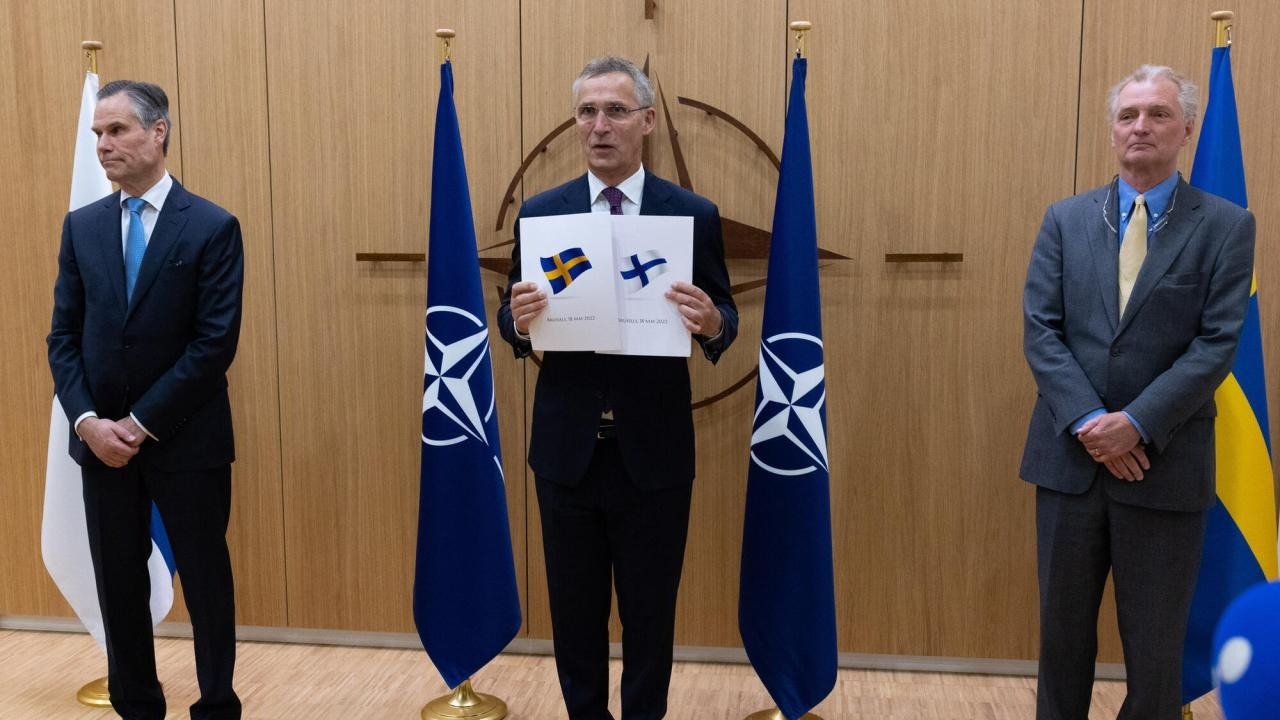
Sweden’s Path into NATO – What has happened
For over 200 years, Sweden has maintained its non-alignment and neutrality. Although the political parties have been predominantly supportive of NATO, they have refrained from pushing the issue, as public opinion has strongly favored maintaining neutrality. However, after Russia’s invasion of Ukraine, the time seemed ripe. It suddenly became urgent to join NATO before public opinion shifted back. However, the burning of Qurans and Turkey’s capriciousness have caused complications.
Spela på dina egna villkor
Det är väl inte särskilt konstigt att man vill kunna bestämma själv över olika val i sitt liv, som med hur man vill använda sig av olika spel. Denna möjlighet är dock större då man väljer onlinespel.

Health Benefits of CBD and What People Use It For
The CBD compound is the second most popular compound we get through extraction from hemp and cannabis plants. The number one in popularity is THC, of course. When we think of THC, we usually connect it to the state of feeling “high,” sometimes even too intensely.

Australian doctors denounce anti-hydroxychloroquine study as fake
MelbourneAustralian infectious disease researchers have raised the alarm about fake data in a study published in The Lancet denouncing the drug hydroxychloroquine in the treatment Covid-19. The Australian Department of Health has been stockpiling millions of doses of hydroxychloroquine.
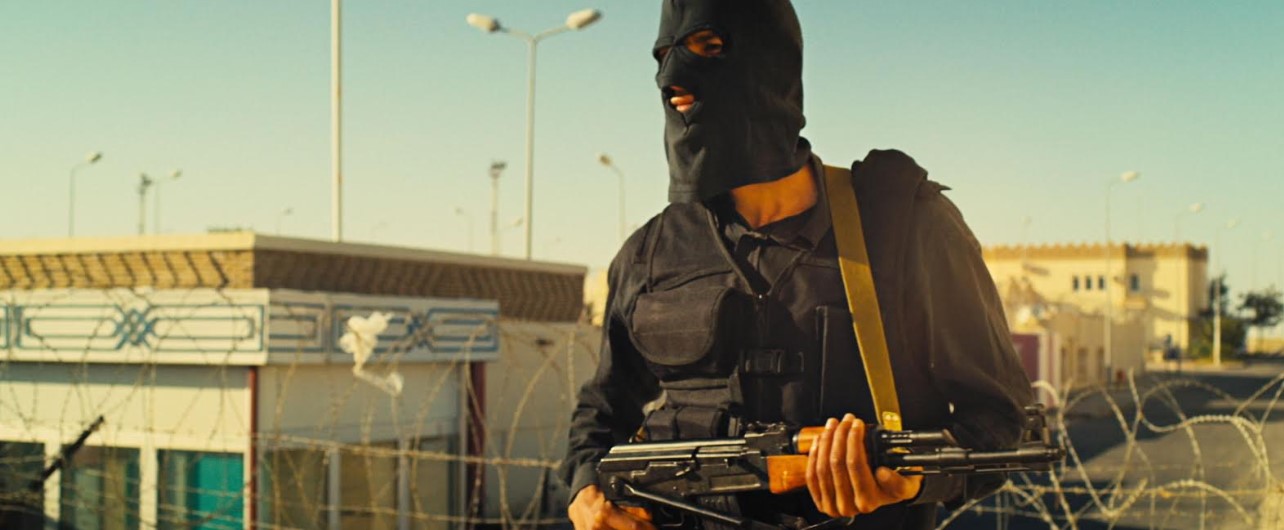
‘Shugaley’: In the hands of Islamist terrorists
The Coronavirus pandemic has not been not an obstacle for the release of a new Russian movie about Libyan war, available online from April.
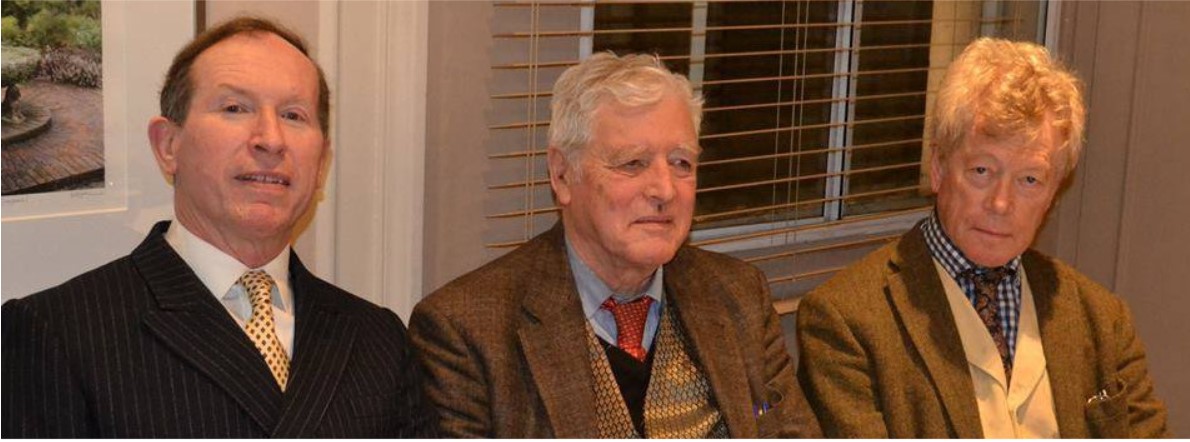
Roger Scruton’s friend: ‘He gave us hope’
Conservative philosopher Roger Scruton is dead. He died on January 12 of cancer. Scruton was honoured in 2016, but last year was subjected to a brutal smear campaign by the mainstream media and was at the end of his life persona non grata among the establishment. When death was imminent, Scruton told him that he had been deprived of both health and reputation, but expressed no resentment, only gratitude for all the positive things he had been involved in. The Swedish news outlet Nya Tider has spoke to Scruton's friend Gregory Lauder-Frost from the Traditional Britain Group.

Merry Christmas to all our readers!
The editorial staff of FreeWestMedia wishes you a blessed Christmas and a happy New Year! We thank you for the loyalty you have shown us throughout the year and for your support.
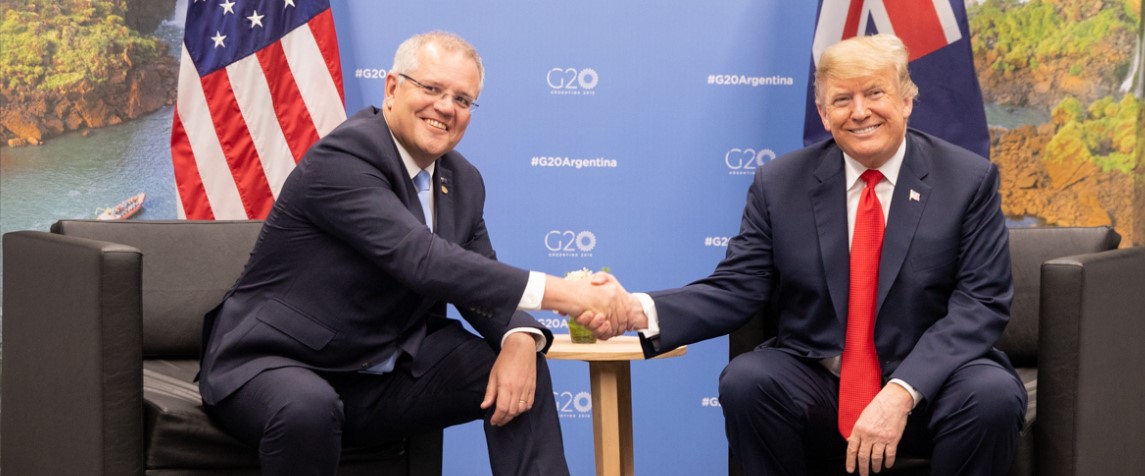
Australia creates fake horoscopes to deter Sri Lankan migrants
CanberraFor two years, Australian authorities have been broadcasting horoscopes with harmful predictions to dissuade potential migrants from carrying out their project.

Will the Yellow Vests conquer the municipal elections?
In the run-up to the 2020 municipal elections, the Yellow Vests intend to weigh in by loudly claiming their demands at a local level. And they will do so without necessarily presenting a list.





